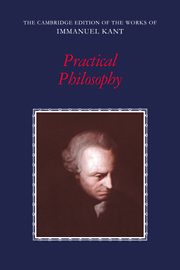Book contents
- Frontmatter
- Contents
- General editors' preface
- Preface
- General introduction
- Review of Schulz's Attempt at an introduction to a doctrine of morals for all human beings regardless of different religions (1783)
- An answer to the question: What is enlightenment? (1784)
- On the wrongfulness of unauthorized publication of books (1785)
- Groundwork of The metaphysics of morals (1785)
- Review of Gottlieb Hufeland's Essay on the principle of natural right (1786) [translated and edited by Allen Wood]
- Kraus's review of Ulrich's Eleutheriology (1788)
- Critique of practical reason (1788)
- On the common saying: That may be correct in theory, but it is of no use in practice (1793)
- Toward perpetual peace (1795)
- The metaphysics of morals (1797)
- On a supposed right to lie from philanthropy (1797)
- On turning out books (1798) [translated and edited by Allen Wood]
- Editorial notes
- Glossary
- Index of names
- Index of subjects
General editors' preface
Published online by Cambridge University Press: 05 June 2012
- Frontmatter
- Contents
- General editors' preface
- Preface
- General introduction
- Review of Schulz's Attempt at an introduction to a doctrine of morals for all human beings regardless of different religions (1783)
- An answer to the question: What is enlightenment? (1784)
- On the wrongfulness of unauthorized publication of books (1785)
- Groundwork of The metaphysics of morals (1785)
- Review of Gottlieb Hufeland's Essay on the principle of natural right (1786) [translated and edited by Allen Wood]
- Kraus's review of Ulrich's Eleutheriology (1788)
- Critique of practical reason (1788)
- On the common saying: That may be correct in theory, but it is of no use in practice (1793)
- Toward perpetual peace (1795)
- The metaphysics of morals (1797)
- On a supposed right to lie from philanthropy (1797)
- On turning out books (1798) [translated and edited by Allen Wood]
- Editorial notes
- Glossary
- Index of names
- Index of subjects
Summary
Within a few years of the publication of his Critique of Pure Reason in 1781, Immanuel Kant (1724–1804) was recognized by his contemporaries as one of the seminal philosophers of modern times – indeed as one of the great philosophers of all time. This renown soon spread beyond German-speaking lands, and translations of Kant's work into English were published even before 1800. Since then, interpretations of Kant's views have come and gone and loyalty to his positions has waxed and waned, but his importance has not diminished. Generations of scholars have devoted their efforts to producing reliable translations of Kant into English as well as into other languages.
There are four main reasons for the present edition of Kant's writings:
1. Completeness. Although most of the works published in Kant's lifetime have been translated before, the most important ones more than once, only fragments of Kant's many important unpublished works have ever been translated. These include the Opus postumum, Kant's unfinished magnum opus on the transition from philosophy to physics; transcriptions of his classroom lectures; his correspondence; and his marginalia and other notes. One aim of this edition is to make a comprehensive sampling of these materials available in English for the first time.
2. Availability. Many English translations of Kant's works, especially those that have not individually played a large role in the subsequent development of philosophy, have long been inaccessible or out of print. Many of them, however, are crucial for the understanding of Kant's philosophical development, and the absence of some from English-language bibliographies may be responsible for erroneous or blinkered traditional interpretations of his doctrines by English-speaking philosophers.
- Type
- Chapter
- Information
- Practical Philosophy , pp. vii - xPublisher: Cambridge University PressPrint publication year: 1996

